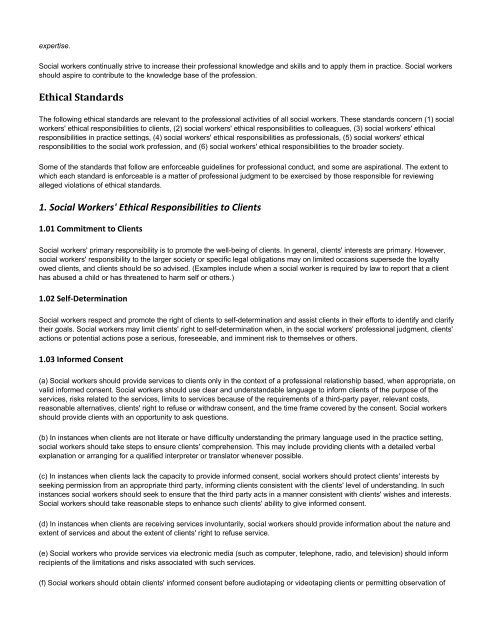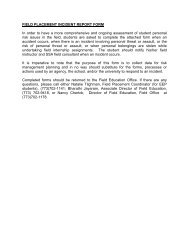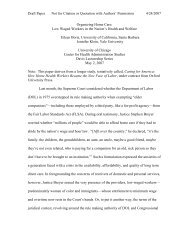expertise.<strong>Social</strong> workers continually strive to increase their pr<strong>of</strong>essional knowledge and skills and to apply them in practice. <strong>Social</strong> workersshould aspire to contribute to the knowledge base <strong>of</strong> the pr<strong>of</strong>ession.Ethical Standards<strong>The</strong> following ethical standards are relevant to the pr<strong>of</strong>essional activities <strong>of</strong> all social workers. <strong>The</strong>se standards concern (1) socialworkers' ethical responsibilities to clients, (2) social workers' ethical responsibilities to colleagues, (3) social workers' ethicalresponsibilities in practice settings, (4) social workers' ethical responsibilities as pr<strong>of</strong>essionals, (5) social workers' ethicalresponsibilities to the social work pr<strong>of</strong>ession, and (6) social workers' ethical responsibilities to the broader society.Some <strong>of</strong> the standards that follow are enforceable guidelines for pr<strong>of</strong>essional conduct, and some are aspirational. <strong>The</strong> extent towhich each standard is enforceable is a matter <strong>of</strong> pr<strong>of</strong>essional judgment to be exercised by those responsible for reviewingalleged violations <strong>of</strong> ethical standards.1. <strong>Social</strong> Workers' Ethical Responsibilities to Clients1.01 Commitment to Clients<strong>Social</strong> workers' primary responsibility is to promote the well-being <strong>of</strong> clients. In general, clients' interests are primary. However,social workers' responsibility to the larger society or specific legal obligations may on limited occasions supersede the loyaltyowed clients, and clients should be so advised. (Examples include when a social worker is required by law to report that a clienthas abused a child or has threatened to harm self or others.)1.02 Self‐Determination<strong>Social</strong> workers respect and promote the right <strong>of</strong> clients to self-determination and assist clients in their efforts to identify and clarifytheir goals. <strong>Social</strong> workers may limit clients' right to self-determination when, in the social workers' pr<strong>of</strong>essional judgment, clients'actions or potential actions pose a serious, foreseeable, and imminent risk to themselves or others.1.03 Informed Consent(a) <strong>Social</strong> workers should provide services to clients only in the context <strong>of</strong> a pr<strong>of</strong>essional relationship based, when appropriate, onvalid informed consent. <strong>Social</strong> workers should use clear and understandable language to inform clients <strong>of</strong> the purpose <strong>of</strong> theservices, risks related to the services, limits to services because <strong>of</strong> the requirements <strong>of</strong> a third-party payer, relevant costs,reasonable alternatives, clients' right to refuse or withdraw consent, and the time frame covered by the consent. <strong>Social</strong> workersshould provide clients with an opportunity to ask questions.(b) In instances when clients are not literate or have difficulty understanding the primary language used in the practice setting,social workers should take steps to ensure clients' comprehension. This may include providing clients with a detailed verbalexplanation or arranging for a qualified interpreter or translator whenever possible.(c) In instances when clients lack the capacity to provide informed consent, social workers should protect clients' interests byseeking permission from an appropriate third party, informing clients consistent with the clients' level <strong>of</strong> understanding. In suchinstances social workers should seek to ensure that the third party acts in a manner consistent with clients' wishes and interests.<strong>Social</strong> workers should take reasonable steps to enhance such clients' ability to give informed consent.(d) In instances when clients are receiving services involuntarily, social workers should provide information about the nature andextent <strong>of</strong> services and about the extent <strong>of</strong> clients' right to refuse service.(e) <strong>Social</strong> workers who provide services via electronic media (such as computer, telephone, radio, and television) should informrecipients <strong>of</strong> the limitations and risks associated with such services.(f) <strong>Social</strong> workers should obtain clients' informed consent before audiotaping or videotaping clients or permitting observation <strong>of</strong>
services to clients by a third party.1.04 Competence(a) <strong>Social</strong> workers should provide services and represent themselves as competent only within the boundaries <strong>of</strong> their education,training, license, certification, consultation received, supervised experience, or other relevant pr<strong>of</strong>essional experience.(b) <strong>Social</strong> workers should provide services in substantive areas or use intervention techniques or approaches that are new tothem only after engaging in appropriate study, training, consultation, and supervision from people who are competent in thoseinterventions or techniques.(c) When generally recognized standards do not exist with respect to an emerging area <strong>of</strong> practice, social workers shouldexercise careful judgment and take responsible steps (including appropriate education, research, training, consultation, andsupervision) to ensure the competence <strong>of</strong> their work and to protect clients from harm.1.05 Cultural Competence and <strong>Social</strong> Diversity(a) <strong>Social</strong> workers should understand culture and its function in human behavior and society, recognizing the strengths that existin all cultures.(b) <strong>Social</strong> workers should have a knowledge base <strong>of</strong> their clients' cultures and be able to demonstrate competence in theprovision <strong>of</strong> services that are sensitive to clients' cultures and to differences among people and cultural groups.(c) <strong>Social</strong> workers should obtain education about and seek to understand the nature <strong>of</strong> social diversity and oppression withrespect to race, ethnicity, national origin, color, sex, sexual orientation, age, marital status, political belief, religion, and mental orphysical disability.1.06 Conflicts <strong>of</strong> Interest(a) <strong>Social</strong> workers should be alert to and avoid conflicts <strong>of</strong> interest that interfere with the exercise <strong>of</strong> pr<strong>of</strong>essional discretion andimpartial judgment. <strong>Social</strong> workers should inform clients when a real or potential conflict <strong>of</strong> interest arises and take reasonablesteps to resolve the issue in a manner that makes the clients' interests primary and protects clients' interests to the greatestextent possible. In some cases, protecting clients' interests may require termination <strong>of</strong> the pr<strong>of</strong>essional relationship with properreferral <strong>of</strong> the client.(b) <strong>Social</strong> workers should not take unfair advantage <strong>of</strong> any pr<strong>of</strong>essional relationship or exploit others to further their personal,religious, political, or business interests.(c) <strong>Social</strong> workers should not engage in dual or multiple relationships with clients or former clients in which there is a risk <strong>of</strong>exploitation or potential harm to the client. In instances when dual or multiple relationships are unavoidable, social workers shouldtake steps to protect clients and are responsible for setting clear, appropriate, and culturally sensitive boundaries. (Dual ormultiple relationships occur when social workers relate to clients in more than one relationship, whether pr<strong>of</strong>essional, social, orbusiness. Dual or multiple relationships can occur simultaneously or consecutively.)(d) When social workers provide services to two or more people who have a relationship with each other (for example, couples,family members), social workers should clarify with all parties which individuals will be considered clients and the nature <strong>of</strong> socialworkers' pr<strong>of</strong>essional obligations to the various individuals who are receiving services. <strong>Social</strong> workers who anticipate a conflict <strong>of</strong>interest among the individuals receiving services or who anticipate having to perform in potentially conflicting roles (for example,when a social worker is asked to testify in a child custody dispute or divorce proceedings involving clients) should clarify their rolewith the parties involved and take appropriate action to minimize any conflict <strong>of</strong> interest.1.07 Privacy and Confidentiality(a) <strong>Social</strong> workers should respect clients' right to privacy. <strong>Social</strong> workers should not solicit private information from clients unlessit is essential to providing services or conducting social work evaluation or research. Once private information is shared,
- Page 4 and 5:
VII. Grading and Problem Solving fr
- Page 7 and 8:
Introduction to Field EducationPoli
- Page 9 and 10:
Field Education Staff and RolesNanc
- Page 11:
Field Readiness WorkshopsRequired f
- Page 15 and 16:
EEP at a GlanceEEP at a Glance2011-
- Page 17 and 18:
Education. Students will coordinate
- Page 19 and 20:
III. Responsibilities of Student in
- Page 21 and 22:
FIELD EDUCATION POLICIESDISCLOSURE
- Page 23 and 24:
7. Students in the School Social Wo
- Page 25 and 26:
THIRD QUARTER OF PLACEMENT• Revie
- Page 27 and 28:
Risk Management and SafetyIncidents
- Page 29 and 30:
IV. Responsibilities of Field Educa
- Page 31 and 32:
Field Instructor ChecklistField Con
- Page 33 and 34:
Selection and Evaluation of Field P
- Page 35 and 36:
V. Learning Contracts and Quarterly
- Page 37 and 38:
In the second year, clinical studen
- Page 39 and 40:
VI. Student Placement ProcessFirst
- Page 41:
Dual Degree StudentsDual Degree stu
- Page 44 and 45:
B. Assignment of a grade of FIn som
- Page 46 and 47:
Steps Toward Field Problem Resoluti
- Page 48 and 49:
Requesting a Field Placement Change
- Page 51 and 52:
THE SCHOOL OF SOCIAL SERVICEADMINIS
- Page 53 and 54:
THE SCHOOL OF SOCIAL SERVICEADMINIS
- Page 55 and 56:
THE SCHOOL OF SOCIAL SERVICEADMINIS
- Page 57 and 58:
STUDENT EVALUATION OF FIELD SEMINAR
- Page 59 and 60:
IX. Tool Box for Field Instructors
- Page 61 and 62:
Quick Reference: Full-Time/Part-Tim
- Page 63 and 64:
Field Placement Safety Discussion F
- Page 65 and 66:
Core Learning ContractDate:Student:
- Page 67 and 68:
3. Apply critical thinking to infor
- Page 69 and 70:
7. Apply knowledge of human behavio
- Page 71 and 72:
10. Engage, assess, intervene, and
- Page 73 and 74:
Clinical Learning ContractDate:Stud
- Page 75 and 76:
3. Apply critical thinking to infor
- Page 77 and 78:
7. Apply knowledge of human behavio
- Page 79 and 80:
10. Engage, assess, intervene, and
- Page 81 and 82:
Social Administration Learning Cont
- Page 83 and 84:
3. Apply critical thinking to infor
- Page 85 and 86:
7. Apply knowledge of human behavio
- Page 87 and 88:
10. Engage, assess, intervene, and
- Page 89 and 90:
Reflection Logs (All Students)Refle
- Page 91 and 92:
MACRO PROJECTS (First Year Requirem
- Page 93:
Program Planning/DevelopmentMACRO P
- Page 96:
School of Social Service Administra
- Page 99 and 100:
SCHOOL OF SOCIAL SERVICE ADMINISTRA
- Page 101 and 102:
Core Quarterly EvaluationDate:Stude
- Page 103 and 104:
3. Apply critical thinking to infor
- Page 105 and 106:
8. Engage in policy practice to adv
- Page 107:
Evidence to Support Ratings and Sum
- Page 110 and 111:
1. Identify as a professional socia
- Page 112 and 113:
5. Advance human rights and social
- Page 114 and 115:
9. Respond to contexts that shape p
- Page 116 and 117:
Evidence to Support Ratings and Sum
- Page 118 and 119:
1. Identify as a professional socia
- Page 120 and 121: 5. Advance human rights and social
- Page 122 and 123: 9. Respond to contexts that shape p
- Page 124 and 125: Evidence to Support Ratings and Sum
- Page 127: BENEFITS AND TRAINING FOR FIELD INS
- Page 130 and 131: Brief Description of the Agency, It
- Page 133 and 134: DIRECT PRACTICEAgency:So that we ma
- Page 135: COMBINED CLINICAL / SOCIAL ADMINIST
- Page 138 and 139: EDUCATION:Including Undergraduate,
- Page 141 and 142: Essential Tools for Field Instructi
- Page 143 and 144: M E M O R A N D U MTO:FROM:Field In
- Page 145 and 146: CONTINUING EDUCATION CREDITSFOR FIE
- Page 163: DIRECT PRACTICEField Instructor's S
- Page 166 and 167: Did I assist the student in thinkin
- Page 168 and 169: 3. The Code is designed to help soc
- Page 172 and 173: standards of confidentiality apply.
- Page 174 and 175: 1.13 Payment for Services(a) When s
- Page 176 and 177: (c) Social workers are prohibited f
- Page 178 and 179: 3.06 Client Transfer(a) When an ind
- Page 180 and 181: (b) Social workers who speak on beh
- Page 182: Social workers should facilitate in
















